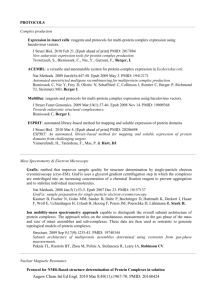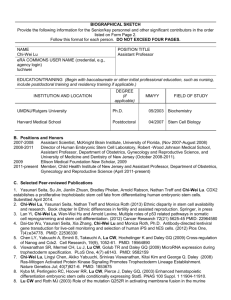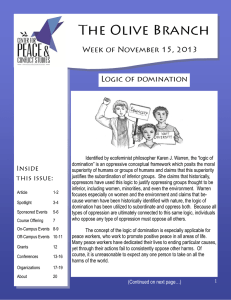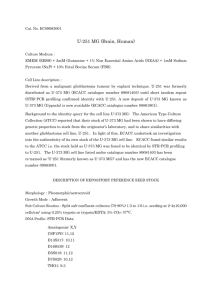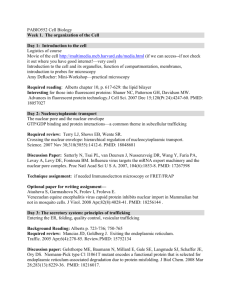Contact Info: Inna N. Shokolenko, PhD Assistant Professor
advertisement
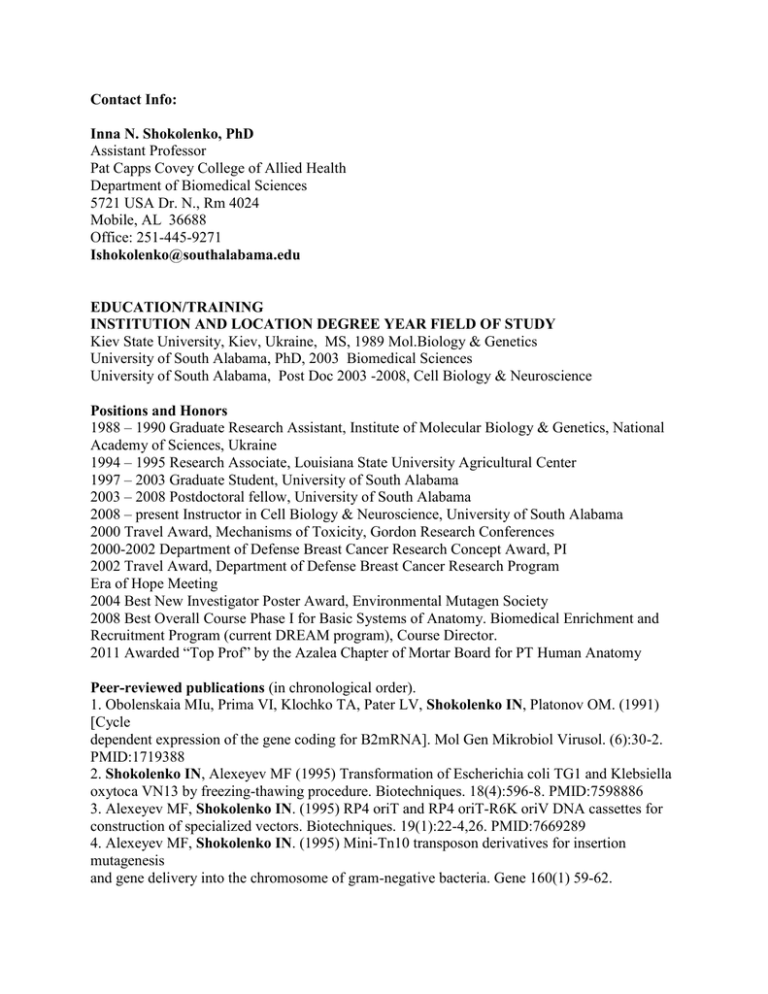
Contact Info: Inna N. Shokolenko, PhD Assistant Professor Pat Capps Covey College of Allied Health Department of Biomedical Sciences 5721 USA Dr. N., Rm 4024 Mobile, AL 36688 Office: 251-445-9271 Ishokolenko@southalabama.edu EDUCATION/TRAINING INSTITUTION AND LOCATION DEGREE YEAR FIELD OF STUDY Kiev State University, Kiev, Ukraine, MS, 1989 Mol.Biology & Genetics University of South Alabama, PhD, 2003 Biomedical Sciences University of South Alabama, Post Doc 2003 -2008, Cell Biology & Neuroscience Positions and Honors 1988 – 1990 Graduate Research Assistant, Institute of Molecular Biology & Genetics, National Academy of Sciences, Ukraine 1994 – 1995 Research Associate, Louisiana State University Agricultural Center 1997 – 2003 Graduate Student, University of South Alabama 2003 – 2008 Postdoctoral fellow, University of South Alabama 2008 – present Instructor in Cell Biology & Neuroscience, University of South Alabama 2000 Travel Award, Mechanisms of Toxicity, Gordon Research Conferences 2000-2002 Department of Defense Breast Cancer Research Concept Award, PI 2002 Travel Award, Department of Defense Breast Cancer Research Program Era of Hope Meeting 2004 Best New Investigator Poster Award, Environmental Mutagen Society 2008 Best Overall Course Phase I for Basic Systems of Anatomy. Biomedical Enrichment and Recruitment Program (current DREAM program), Course Director. 2011 Awarded “Top Prof” by the Azalea Chapter of Mortar Board for PT Human Anatomy Peer-reviewed publications (in chronological order). 1. Obolenskaia MIu, Prima VI, Klochko TA, Pater LV, Shokolenko IN, Platonov OM. (1991) [Cycle dependent expression of the gene coding for B2mRNA]. Mol Gen Mikrobiol Virusol. (6):30-2. PMID:1719388 2. Shokolenko IN, Alexeyev MF (1995) Transformation of Escherichia coli TG1 and Klebsiella oxytoca VN13 by freezing-thawing procedure. Biotechniques. 18(4):596-8. PMID:7598886 3. Alexeyev MF, Shokolenko IN. (1995) RP4 oriT and RP4 oriT-R6K oriV DNA cassettes for construction of specialized vectors. Biotechniques. 19(1):22-4,26. PMID:7669289 4. Alexeyev MF, Shokolenko IN. (1995) Mini-Tn10 transposon derivatives for insertion mutagenesis and gene delivery into the chromosome of gram-negative bacteria. Gene 160(1) 59-62. PMID:7628717 5. Alexeyev MF, Shokolenko IN, Croughan TP. (1995) Improved antibiotic-resistance gene cassettes and omega elements for Escherichia coli vector construction and in vitro deletion/insertion mutagenesis. Gene 160(1) 63-67. PMID:7628718 6. Alexeyev MF, Shokolenko IN, Croughan TP. (1995) New mini-Tn5 derivatives for insertion mutagenesis and genetic engineering in gram-negative bacteria. Canadian Journal of Microbiology 41(11) 1053-1055. PMID:7497352 7. Balbas P, Alexeyev M, Shokolenko IN, Bolivar F, Valle F. (1996) A pBRINT family of plasmids for integration of cloned DNA into the Escherichia coli chromosome. Gene 172(1) 65-69. PMID:8654993 8. Wang G, Xu X, Pace B, Dean DA, Glazer PM, Chan P, Goodman SR, Shokolenko I. (1999) Peptide nucleic acid (PNA) binding-mediated induction of human gamma-globin gene expression. Nucleic Acids Res. 1999 Jul 1;27(13):2806-13. PMID:10373600 9. Shokolenko IN, Oberyszyn TM, D’Ambrosio SM, Saavedra JE, Keefer LK, LeDoux SP, Wilson GL, Robertson FM. (2001) Protection of Human Keratinocyte mtDNA by Low-level Nitric oxide. Nitric Oxide. 5(6) 555-560. PMID: 11730362 10. Shokolenko IN, Alexeyev MF, Robertson FM, LeDoux SP, Wilson GL. (2003) The Expression of Exonuclease III from E. coli in Mitochondria of Breast Cancer Cells Diminishes Mitochondrial DNA Repair Capacity and Cell Survival After Oxidative Stress. DNA Repair 2(5) 471-482. PMID: 12713808 11. Alexeyev MF, Pastukh VV, Shokolenko IN, Wilson GL. (2004) alpha-complementationenabled T7 expression vectors and their use for the expression of recombinant polypeptides for protein transduction experiments. Methods Mol Biol. 267: 91-100. PMID: 15269417 12. Shokolenko IN, Alexeyev MF, LeDoux SP, Wilson GL (2005) TAT-mediated protein transduction and targeted delivery of fusion proteins into mitochondria of breast cancer cells. DNA Repair. 4(4) 511-518. PMID: 15725631 13. Pastukh V, Shokolenko I, Wang B, Wilson G, Alexeyev M (2007) Human mitochondrial transcription factor A possesses multiple subcellular targeting signals. FEBS J. 274(24): 648899. PMID: 18028422 14. Pastukh VV, Shokolenko IN, Wilson GL, and Alexeyev MF. (2008) Mutations in the passenger polypeptide can affect its partitioning between mitochondria and cytoplasm: Mutations can impair the mitochondrial import of DsRed. Mol. Biol. Rep. 35(2): 215-23. PMID: 17385058 15. Alexeyev MF, Venediktova N, Pastukh V, Shokolenko I, Bonilla G, Wilson GL. (2008) Selective elimination of mutant mitochondrial genomes as therapeutic strategy for the treatment of NARP and MILS syndromes. Gene Ther. 15(7):516-23. PMID: 18256697 16. Shokolenko I, Venedictova N, Bochkareva A, Wilson GL, Alexeyev MF (2009) Oxidative stress induces degradation of mitochondrial DNA. Nucleic Acids Res. 37(8): 2539-48. PMID: 19264794 17. Koczor CA, Snyder JW, Shokolenko IN, Dobson AW, Wilson GL, Ledoux SP. (2009) Targeting repair proteins to the mitochondria of mammalian cells through stable transfection, transient transfection, viral transduction, and TAT-mediated protein transduction. Methods Mol Biol. 554: 233-49. PMID: 19513678 18. Alexeyev MF, Fayzulin R, Shokolenko IN, Pastukh V. (2010) A retro-lentiviral system for doxycycline-inducible gene expression and gene knockdown in cells with limited proliferative capacity. Mol Biol Rep. 37(4):1987-91. PMID: 19655272 19. Koczor CA, Shokolenko IN, Boyd AK, Balk SP, Wilson GL, Ledoux SP. (2009) Mitochondrial DNA damage initiates a cell cycle arrest by a Chk2-associated mechanism in mammalian cells. J Biol Chem. 284(52):36191-201. PMID:19840931 20. Shokolenko IN, Alexeyev MF, LeDoux SP, Wilson GL. (2010) The approaches for manipulating mitochondrial proteome. Environ Mol Mutagen. 51(5):451-61. PMID:20544885 Research support 5R01RR031286-02 Alexeyev, M (PI) 6/1/2010-2/28/2014 NIH/NCRR Mouse models for mitochondrial disorders caused by mtDNA mutations Animal (mouse) models of human disease are instrumental in developing and testing new therapeutic modalities, yet they are not available for mitochondrial diseases caused by mtDNA mutations. In this application we propose to generate transmitochondrial mice with mtDNA mutations to model human disease. Role: Co-Investigator
